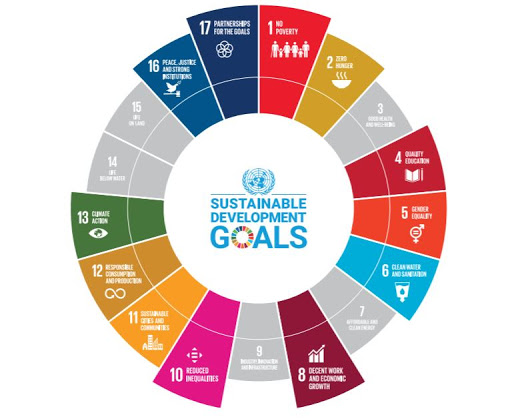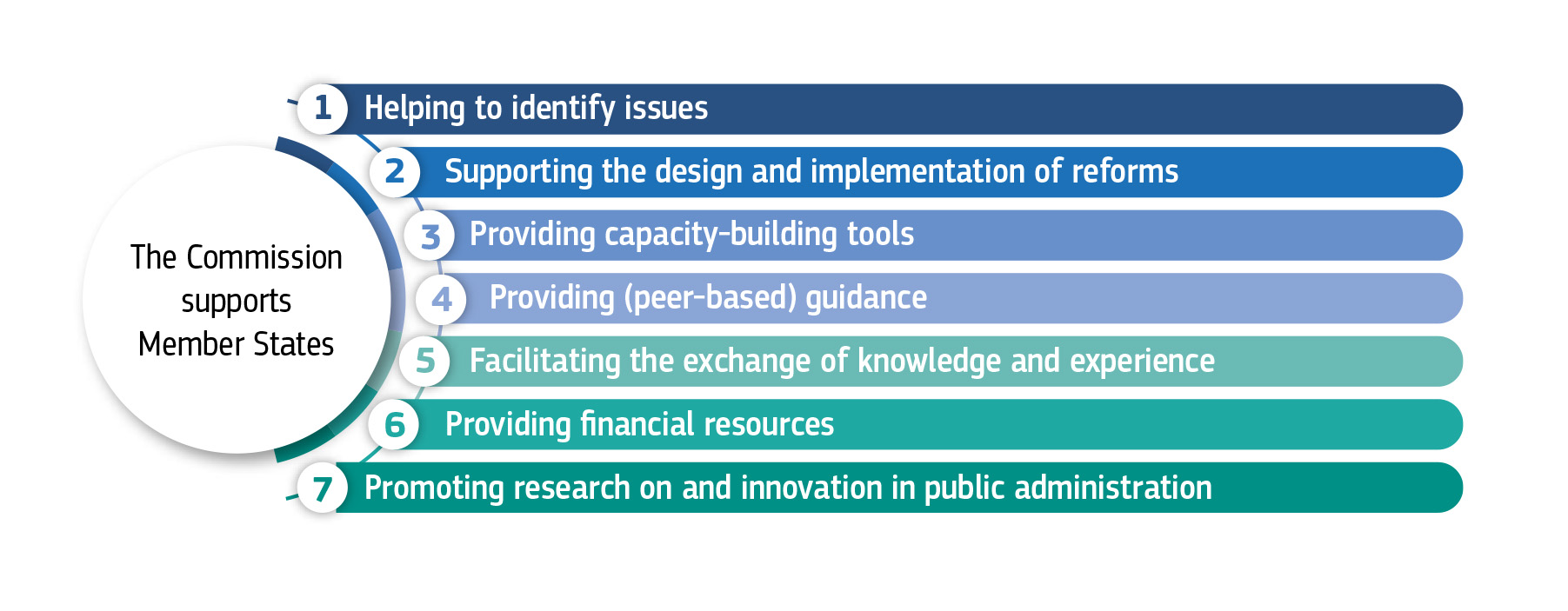The Joint Migration Policy Whitepaper produced by the six H2020 projects: REBUILD, MIICT, NADINE, MICADO, EASYRIGHTS and WELCOME, is mentioned as a good example of Horizon 2020 research on public administration in the Commission’s working paper: Supporting public administrations in EU Member States to deliver reforms and prepare for the future.
In order to better understand this research achievement and further develop our joint efforts, let’s have a brief review of this working paper.
Public administrations are the bodies that at national, regional and local level, deliver crisis response, provide services and substantially contribute building the resilience needed for the sustainable development of the European economy. Good public administration enables economic prosperity, social progress and fairness.
The EU’s institutions and Member States identify, design and implement policies to improve the lives of the 445 million people living in the European Union. This work ranges from overcoming the momentous COVID-19 health crisis to addressing the more long-term challenges of making Europe climate-neutral, sustainable, and ready for the next digital decade.
Among the many components of this urgent and important policy agenda, the quality and capability of public administrations of the Member States deserve special attention because:
- Public administrations at national, regional and local level are the ones that deliver crisis response, provide services, implement reforms, manage investments and, more generally, manage public spending to create expected social value.
- They translate EU law and programmes into concrete actions with long-term effects on economic, social and territorial cohesion, as well as on technological progress.
- They are responsible for the effective and efficient uptake of the EU Funds. They play a fundamental role in preserving the EU’s shared values.

The Commission has been actively cooperating with the Member States to have quality public administration, through:
- the identification of critical issues,
- the support to the design and deployment of reforms,
- the provision of capacity-building tools and of (peer-based) guidance,
- the facilitation of exchange of knowledge and experience,
- financial support and
- the promotion of research and innovation in the area of public administration.
The Working paper “Supporting public administrations in EU Member States to deliver reforms and prepare for the future.”
The working paper is prepared by the Directorate-General for Structural Reform Support Unit REFORM.B.2 Governance & Public Administration based on the Commission Staff Working Document SWD(2021)101 - Supporting Public Administrations in EU Member States to Deliver Reforms and Prepare for the Future.
The working document is based on the premise that the current moment presents not only profound challenges but also unique opportunities for the administrations. They need to rethink, redesign and redeploy themselves to operate effectively and to prepare for the needs of the next generation in an increasingly complex, interrelated and uncertain environment.
Section 2 of the document draws attention to the role of Member States’ public administrations as the engine that drives the EU.
Section 3 highlights the challenges that lie ahead for public administrations and suggests possible improvements.
Sections 4 and 5 present the Commission’s initiatives to help EU and neighbourhood countries build better public administrations.
Section 4: Commision’s initiatives to support Member States in facing the challenges of public administration

To help Member States address the challenges that public administration and Member State governments face, the Commission has developed a wide range of instruments over the years: from strategic and operational analysis to the design and the financing of reforms and investments; from the provision of evidence to advice and guidance from relevant stakeholders, including other Member States.
This section of working paper focuses on the following issues:
Helping to identify issues: The European Semester helps detect the challenges for each country’s administrative system. Over the past 10 years, there have been 170 country-specific recommendations encouraging measures in more than 20 countries. Commission-produced scoreboards, also aim to provide an overview of the performance of Member States’ public administrations and help understand the root problems.
Supporting the design and implementation of reforms: This paragraph is mainly referred to the Technical Support Instrument (TSI) aiming to support Member States to improve the quality of their SOLVIT services to citizen.
Providing capacity-building tools: such as TAIEX-REGIO Peer2Peer and REGIO Communities of Practitioners, the Integrity Pacts, the Transnational ESF+ Platform, online videos on how to prevent and identify fraud and corruption, and transnational cooperation networks. Also, the EU Academy a new and growing EU owned online hub providing online training resources on EU matters.
Providing (peer-based) guidance through tools such as the Quality of Public Administration Toolbox, and the Environmental Implementation Review. Furthermore, the Commission has developed a number of competency frameworks for specific domains of public administration to guide Member States in developing the capacities (CustCompEU for customs officers and TaxComEU for tax officers).
Facilitating the exchange of knowledge and experience: The Commission provides knowledge services like the Knowledge4Policy platform that brings together policymakers and scientists across the EU for evidence-informed policymaking. The eGovernment Action Plan Steering Board shares knowledge and best practices on digital government. Joinup.eu is Europe’s collaborative platform on public sector interoperability.
Facilitating the exchange of knowledge and experience: EU funding has been a major tool to address administrative challenges. Funds include the Recovery and Resilience Facility for the period 2021-2026, the cohesion policy instruments and the sectoral programmes. Also, the Digital Europe programme that supports the digital transformation of public administrations and the delivery of interoperable public services.
Promoting research on and innovation in public administration: Horizon 2020 has provided approximately EUR 188.5 million in funding for over 55 research and innovation projects on e-government and digital transformation (114), involving over 500 different entities (including universities, research institutes, public administrations, etc.) from across more than 35 different countries (mostly Member States). Its successor, Horizon Europe, will continue to support innovation through dedicated actions, especially as regards the green and digital transitions, and the Horizon Europe missions.
The section is refered to some examples of Horizon 2020 research on public administration, among them to the Joint Migration Policy Whitepaper:
The MIICT, REBUILD, NADINE, MICADO, EASYRIGHTS and WELCOME projects prepared ICT solutions and toolkits, which will allow public administrations to offer services that help to better integrate migrants in European societies. They have produced a joint migration policy white paper with policy recommendations for public administrations.
Conclusions
The Joint Migration Policy Whitepaper produced by the six H2020 migration projects seems to be a successful example of how the joint research effort can be effective and supportive. Rebuild project will continue to work on this direction, with research synergies and networking for and an accessible, inclusive and human-centred service delivery, both innovative, effective and efficient.
Read the full EU working document here: >>>>>>>>>>>>>>>>>>>>>>>
Read more and get the full Joint Migration Policy Whitepaper here: >>>>>>>>>>>>>>>